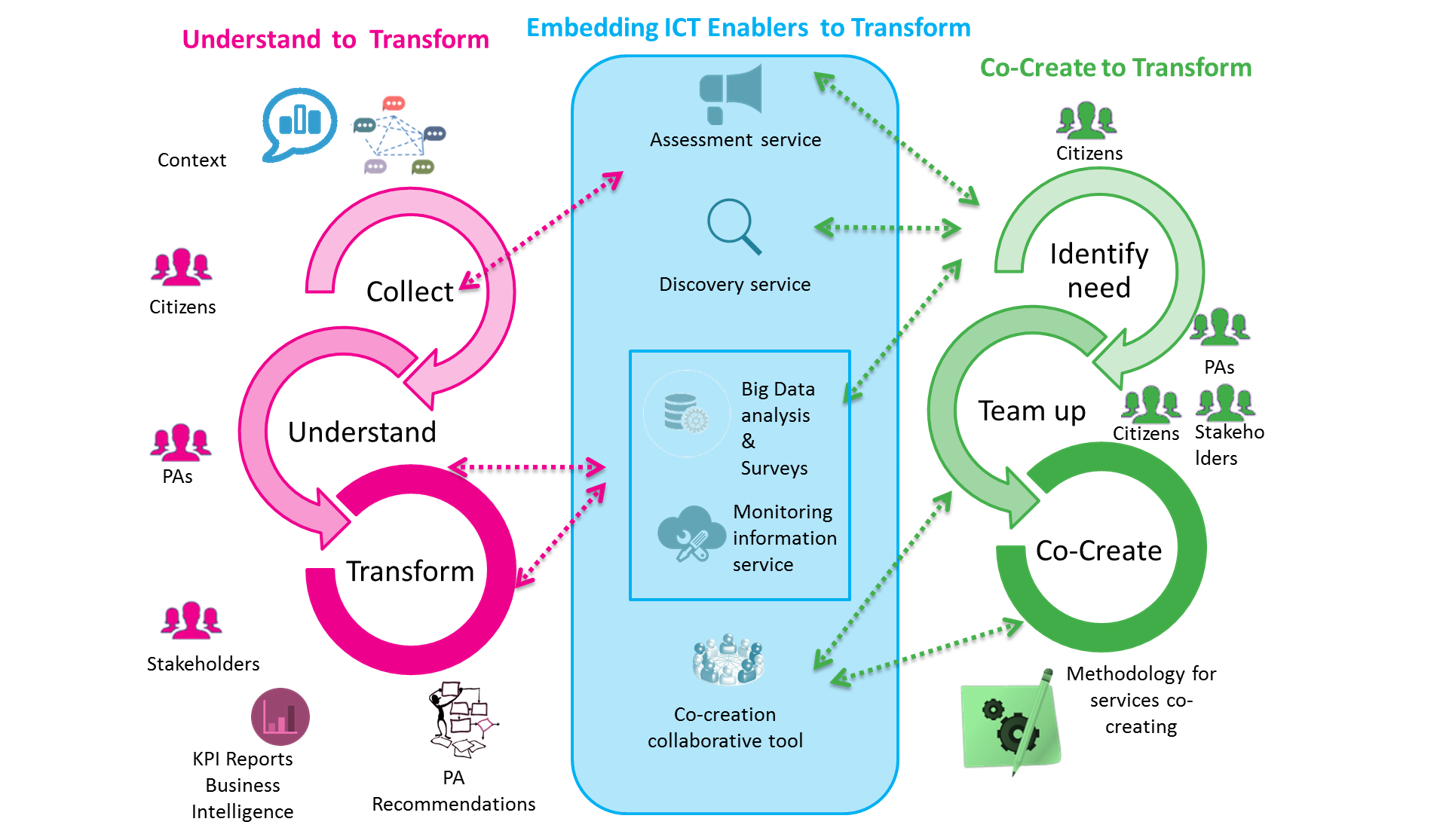CITADEL is a European H2020 Project involving twelve partners. These are research institutes, universities, public sector entities and IT companies from five different European countries.
The project’s objective is to create an ecosystem of best practices for a transparent, innovative and cooperative public sector and to provides more efficient and inclusive tools to respond to citizen requirements. The CITADEL ecosystem combines and promotes a set of technologies (e.g. semantics, mobile, analytics, sentiment analysis, open linked data) to both empower Public Administrations (PAs) to improve their offering and the engagement of citizens, as well as to foster cooperation among PAs and users of public services in local, regional and national environments.
The CITADEL approach

is characterized by the ability, through the development of an open and scalable platform based on innovative ICT systems, to understand, transform and improve by proposing recommendations to enhance the PAs policies and processes with a view to deliver effective, inclusive and high quality public services across Europe.
THE BARI MUNICIPALITY PILOT: AN INNOVATIVE SMART WORKING CASE STUDY
Smart working is a way of working featuring an absence of specific time or space constraints and focused instead on the achievement of stages, cycles and objectives that is established in the agreement between employees and employers. It is a tool that helps the worker to achieve work-life balance, but it also favours increased productivity.
This approach to work is being pursued by Public Administrations (PAs). In Italy, for instance, flexible working (Lavoro Agile in Italian regulation) is explicitly defined by law 81/2017 (“Measures for the protection of non-entrepreneurial self-employment and measures to encourage flexibility in the time and place of subordinate work”). Further specific measures for flexible working in the public sector are provided by law 124/2015 (“Delegations to the Government regarding the reorganization of public administrations”).
Compliance of Distributed Ledger Technology (DLT) based solutions with the European Union General Data Protection Regulation (EU GDPR 2016/679) is currently a hot topic both from a technical point of view, as well as from a legal and regulatory one. In this context privacy and information trustworthiness are key and these can be achieved in this context through the use of DLT-based solutions, in compliance with GDPR.
We have developed a smart working android application to register hours and locations of flexible working activities, as these are the critical to ensure compliance with contractual and insurance conditions, in addition to guaranteeing compliance with the right to disconnect. The application combines DLT and latest Ciphertext-Policy Attribute-Based Encryption cryptographic techniques to support compliance with the EU GDPR in the context of flexible working.
We supported the Municipality of Bari in the development of a smart working pilot

The Municipality of Bari has already formalized activation of smart working for its employees, investing in experimenting with innovative ICT solutions based on the use of DLT technology and assuring trustworthiness, integrity, immutability and GDPR compliance. The flexible working program devised by the Municipality of Bari gives the opportunity to any requesting employee to perform their office activities in flexible working for 1 or 2 days/week, between 6:00 to 22:00, with a variable number of breaks. The only constraint is to guarantee a pre-defined availability period of 2 hours within the total number of working hours envisaged by their contract.
The system has been designed in strict compliance with two principles: the privacy-by-design principle and the privacy-by-default principle. The system envisages adequate measures to safeguard the confidentiality of personal and sensitive information right from the design stage (privacy-by-design principle). The default settings of the system guarantee an adequate level of protection of personal/sensitive data, and, at the same time, there is a critical level of data protection that cannot be reduced (privacy-by-default principle).
Ethereum is the DLT technology adopted. The Flexible Worker App is installed on the worker's android device and used to acquire and transmit the worker's data via DLT's transactions. The Supervisor Web Application is used by supervisors to analyse employees' activities and the impact of flexible working the performance of the public sector. The Attendance Registry DLT Oracle interfaces the Ethereum DLT with the Attendance Registry Service of the Municipality.